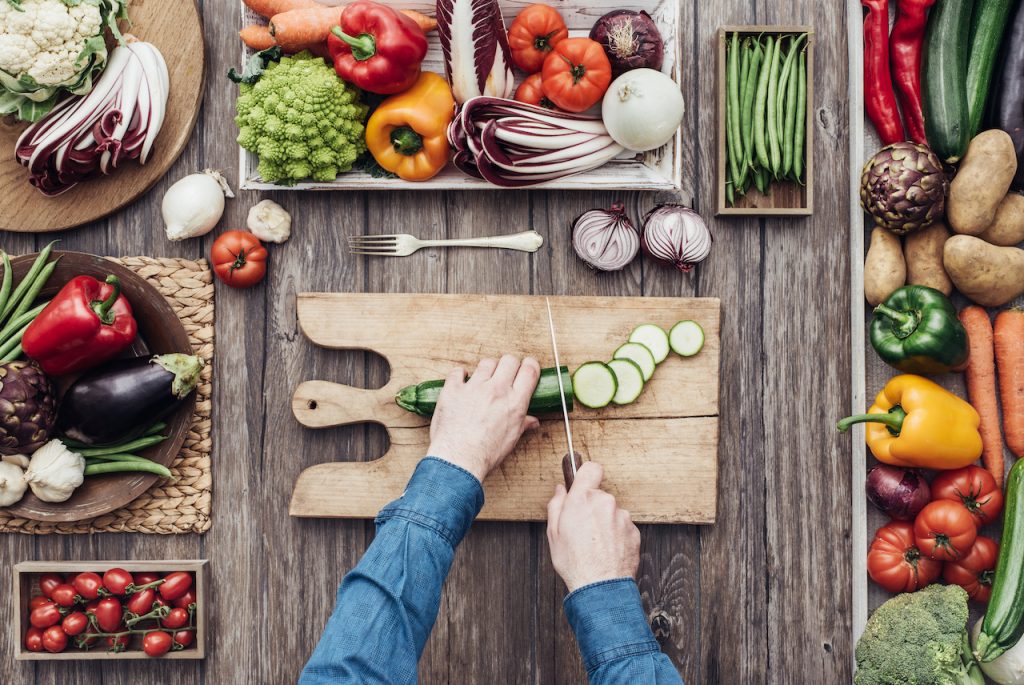

In 2013 my wife and I traveled to the Peruvian Amazon. The Amazon is a harsh environment, and you need to know what you’re doing and where you’re going.
So we hired a guide and a small boat and cruised along the great river. What you see in the pictures I added to this post, is a simple lunch we made one day composed of grilled Piranha fish we spear-hunted(!), rice, and salad which as you can see, I attempted cutting with a machete.
What you can’t see in the pictures, are the swarms of mosquitoes and especially angry amazonian wasps hovering over us.
Nor you can feel the extreme heat and humidity.
But we HAD to cook our lunch. It was either that or staying hungry.
Cooking in this environment, in these conditions, was an amazing experience for me. The fact that we were able to prepare a simple yet very satisfying meal (although the Piranha were a little bony) gave me some perspective about the comfort of our western lives. Which brings me to why I think we should cook more.
Cooking – A Dying Craft?

If you ask me what the single important thing you can do to improve your health and well-being is, it would be to start cooking.
Cooking is the most fundamental change you can do to improve your nutrition and health because it allows you to regain control over the food you eat and on your health.
In his book, Cooked – A Natural History of Transformation, Michael Pollan describes an interesting paradox in the American society today and, actually, all over the Western world: we spend more and more time watching cooking TV shows and reading about cooking and less time actually cooking. I would add staring at food pictures on Instagram as well.
The average American, according to Pollan, spends only 27 minutes a day in the kitchen. Realistically, even those 27 minutes are not actual cooking time. For many us, “cooking” means heating a pre-made TV dinner in the microwave or pouring some boiled water over dried ramen noodles.
In the last few decades, we’ve almost completely outsourced the essential activity of cooking. We do it by eating out in restaurants or by eating highly processed food that was made in a factory and is ready to eat, or requires one or two simple preparation actions. We gain convenience, but it is a convenience that comes with an increasing price.
The Problem In Eating Out
By distancing ourselves from the activity of cooking, we lose control of our health most fundamentally. When it comes to processed food, the price is not hard to track. The amount of research and information about the damaging effect of chemicals, sugar, and bad fats in processed foods is staggering.
But the problem is also in the less obvious places. Restaurants, even the higher end restaurants, do not always use the best ingredients.
A good example would be the kind of oils restaurants use. Many restaurants use highly processed seed oils like sunflower oil, corn oils, or canola oil. Deep frying, for example, is impossible to do with high-quality oil, and even if it were, it would be much too costly for the restaurant. Oils that are used for deep frying are not only processed and damaging by themselves, but many times, they are reused, which means that they are highly oxidized and toxic to your body.
Restaurants add sugar to many dishes you wouldn’t expect them to, such as tomato pasta sauce, for example. The delicious sweetness of the sauce does not always come from the natural sweetness of the tomato. Sugar is used many times to deepen the flavors of dishes that were not given enough time to cook and naturally create their depth and richness.
I worked in high-end restaurants as a chef for ten years. I have a deep respect for restaurant owners and chefs for their dedication and courage for choosing this crazy, highly demanding profession. But restaurants are businesses too, and the people behind them need to make a living.
In this razor-thin-margin business, you sometimes have to cut costs by either using lower quality ingredients or by hiring a less skilled worker. These compromises are translated to food that, many times, don’t serve your health.
Food Has Energy
And there is also the less tangible element of “love” or “energy” that is put in the food that is made at home by yourself, a friend or a family member. This is, obviously, not an exact science, but a homemade meal just feels different.
In the years of working in professional kitchens, I know very well how physically and mentally demanding the work can be. Long shifts, almost unbearably hot environment, and stress take their toll. Cooks work in this environment day after day. They prepare the same dishes hundreds of times and are expected to bring every dish to its full potential of perfection and flawlessness. In reality, that’s far from being the case.
Food that was made by an angry or distracted cook will not be as good as food that got the attention and intention it deserves. A homemade meal also means a meal that was prepared in a calm and relaxed environment, and it makes a big difference.
Cooking will put you in touch with your body and health in a deep sense that no other way will. I’ve written before about the using of food as medicine. If food is the medicine, then you as the cook are your own pharmacist and doctor. When you deepen your experience with cooking, you become more attentive to your or others’ specific needs. Different times, seasons, and physical and mental conditions call for different types of foods. The more you cook, the more attentive and sensitive you become to the adjustments needed.
Years of daily cooking taught me that the act of cooking by itself has some great benefits. Cooking can give you a grounding sensation. I know for myself that cooking puts me in what runners like to call the “zone.” Entering this environment of raw materials and smells and holding a knife in my hand feels very primal. For me, it feels like returning home. In our modern world, when so much we do is in the electronic spheres, on the web or in the cloud, cooking can be a great way to regain balance. Cooking is simple and tangible. The results are immediate, and you sense these results with all of your senses. Cooking puts you back in your body.
So go back into the kitchen. Don’t be one of these people whose kitchens are sterile, untouched zones where the microwave is the only object that works. Your kitchen was made to be used and get dirty (and cleaned later).
One more thing – a machete is not the most efficient tool for cutting a salad…



